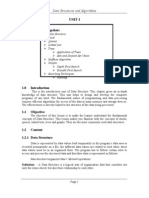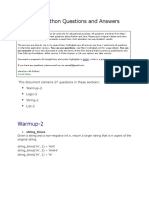3. Stack - Sample Program
Uploaded by
mohanvino3. Stack - Sample Program
Uploaded by
mohanvinoData Structures and Algorithms Design (SS ZG519) 1
Stack Program - Sample. Author: Prof. Vineet Garg
Sample main program that uses stack functions:
/* --------------------------- Link Section---------------------------------*/
#include <stdio.h>
#include <conio.h>
#include <stdlib.h>
/* ---------------------------Constants ------------------------------------*/
#define TRUE 1
#define FALSE 0
#define STACK_EMPTY_VALUE -1
#define SUCCESS 1
#define NO_SUCCESS 0
typedef int boolean;
/* -------------------------Global Variables -------------------------------*/
int *pIntStack = NULL;
int stackSize = 0;
int top = -1;
/* -------------------------Function prototypes ----------------------------*/
int *createStack (void);
boolean isStackEmpty (void);
boolean isStackFull (void);
int push (int element);
int pop (int *element);
void destroyStack (void);
/*---------------------main program ------------------------------------------*/
void main()
{
boolean result;
int element;
clrscr();
/* Get the stack size from the user into the global variable – stackSize */
printf("Enter the stack size to keep integers: \n");
scanf("%d", &stackSize);
/* Create stack of stackSize */
pIntStack = createStack ();
/* Check if stack is empty */
result = isStackEmpty();
Data Structures and Algorithms Design (SS ZG519) 2
Stack Program - Sample. Author: Prof. Vineet Garg
/* Print the stack empty or not based on the result */
if (result == TRUE)
{
printf("Stack is empty.\n");
}
else
{
printf("Stack is not empty.\n");
/* Push an integer to stack. E.g. 43 */
result = push(43);
/* Print the push result */
if (result == SUCCESS)
{
printf("Push successful.\n");
}
else
{
printf("Push failed.\n");
/* Pop out an element from stack. It will be stored in element */
result = pop (&element);
if (result == SUCCESS)
{
printf("Popped out element is %d.\n", element);
}
else
{
printf("Pop failed, because stack is empty.\n");
/* Sample program is done; destroy the stack */
printf("Program is complete, destroying the stack.\n");
destroyStack();
/* Wait for the user input before end */
getch();
}
Data Structures and Algorithms Design (SS ZG519) 3
Stack Program - Sample. Author: Prof. Vineet Garg
int *createStack()
This function creates a stack dynamically that will keep integers:
int *createStack()
{
int *x = NULL;
/* stackSize is a global variable it will be read from the user input */
x = (int *) calloc (stackSize, sizeof(int));
if (x == NULL)
{
printf("Error in stack memory allocation.\n");
exit(0);
}
/* Else, memory allocation for stack is successful, return pointer to it and
initial top value is STACK_EMPTY_VALUE (that is defined as -1).
*/
else
{
top = STACK_EMPTY_VALUE;
return x;
}
}
boolean isStackFull ()
This function checks if stack is full by checking the value of top. If it has reached to (stackSize-
1) it is full (TRUE), otherwise not (FALSE):
boolean isStackFull()
{
/* C stores array values from 0 to n-1, so used stackSize-1 */
if (top == stackSize-1)
{
return TRUE;
}
else
{
return FALSE;
}
}
boolean isStackEmpty ():
Data Structures and Algorithms Design (SS ZG519) 4
Stack Program - Sample. Author: Prof. Vineet Garg
This function checks if stack is empty by checking the value of top. If it is
STACK_EMPTY_VALUE (-1) it is empty (TRUE), otherwise not (FALSE).
boolean isStackEmpty()
{
if (top == STACK_EMPTY_VALUE)
{
return TRUE;
}
else
{
return FALSE;
}
}
int push (int element):
This function pushes an element into stack. If stack is full push has NO_SUCCESS, otherwise
increase top by 1, and stores the element on stack at this top value index and return
SUCCESS.
int push (int element)
{
if (isStackFull() == TRUE)
{
return NO_SUCCESS;
}
else
{
top++;
pIntStack[top] = element;
return SUCCESS;
}
}
int pop (int *element):
Data Structures and Algorithms Design (SS ZG519) 5
Stack Program - Sample. Author: Prof. Vineet Garg
This function pops out an element from stack. If stack is empty then pop has NO_SUCCESS,
otherwise, it returns the value stored at the index top and then decrements the top by 1.
Note that in case of SUCCESS, the popped out element is saved in element that is an
argument whose reference is passed in the function.
int pop (int *element)
{
if (isStackEmpty() == TRUE)
{
return NO_SUCCESS;
}
else
{
*element = pIntStack[top];
top --;
return SUCCESS;
}
}
void destroyStack():
This function destroys the stack (if it exists) and re-initializes the global variables.
void destroyStack()
{
if (pIntStack != NULL)
{
free(pIntStack);
pIntStack = NULL;
stackSize = 0;
top = -1;
}
}
You might also like
- EENG212 - Algorithms & Data Structures: StacksNo ratings yetEENG212 - Algorithms & Data Structures: Stacks5 pages
- DS (KCS-301) Unit 2 CSE Stack (Till ST)No ratings yetDS (KCS-301) Unit 2 CSE Stack (Till ST)15 pages
- Stack Adt: Data Structures Department of CSE 2018 - 2019No ratings yetStack Adt: Data Structures Department of CSE 2018 - 201927 pages
- Stacks: EENG212 - Algorithms and Data StructuresNo ratings yetStacks: EENG212 - Algorithms and Data Structures21 pages
- Lecture - 2 - Stacks (Envy's Conflicted Copy 2016-03-03)No ratings yetLecture - 2 - Stacks (Envy's Conflicted Copy 2016-03-03)52 pages
- WINSEM2018-19 - CSE2003 - ETH - SJT311 - VL2018195002472 - Reference Material I - Introduction - Stack - QueueNo ratings yetWINSEM2018-19 - CSE2003 - ETH - SJT311 - VL2018195002472 - Reference Material I - Introduction - Stack - Queue51 pages
- Stack (Data Structure) : "Pushdown" Redirects Here. For The Strength Training Exercise, SeeNo ratings yetStack (Data Structure) : "Pushdown" Redirects Here. For The Strength Training Exercise, See15 pages
- C Program To Find Sum of Diagonal Elements of A MatrixNo ratings yetC Program To Find Sum of Diagonal Elements of A Matrix10 pages
- Ordinary Seaman or Unlicenced Engineer or Tankerman TraineeNo ratings yetOrdinary Seaman or Unlicenced Engineer or Tankerman Trainee5 pages
- Norm-Based Mechanism Design: Nils Bulling, Mehdi DastaniNo ratings yetNorm-Based Mechanism Design: Nils Bulling, Mehdi Dastani1 page
- GLS - GSS613 Spatial Data Analyses and ModellingNo ratings yetGLS - GSS613 Spatial Data Analyses and Modelling112 pages
- About Me Educational Backgrounds: Bachelor Degree in Mechanical EngineeringNo ratings yetAbout Me Educational Backgrounds: Bachelor Degree in Mechanical Engineering2 pages
- Online Catering System With Price Sorting AlgorithmNo ratings yetOnline Catering System With Price Sorting Algorithm56 pages
- Professional Teacher - Secondary (Social Studies)No ratings yetProfessional Teacher - Secondary (Social Studies)64 pages
- Instructions - Fortigate Cli Reference Mr6100% (5)Instructions - Fortigate Cli Reference Mr614 pages
- 1555331373.somalia Databases and Beneficiary Registries For Cash Transfer ProgrammingNo ratings yet1555331373.somalia Databases and Beneficiary Registries For Cash Transfer Programming39 pages
- DIG The UK BIZ Links W Robert Hunter BidenNo ratings yetDIG The UK BIZ Links W Robert Hunter Biden27 pages
- Codingbat Python Questions and Answers Section 2: Warmup-2No ratings yetCodingbat Python Questions and Answers Section 2: Warmup-213 pages
- Hot-Indian-Telugu-Stories-01: Contributed by0% (1)Hot-Indian-Telugu-Stories-01: Contributed by40 pages
- Cryptocurrencies and Blockchain Technologies: Dan Boneh Benedikt Bünz Stanford UniversityNo ratings yetCryptocurrencies and Blockchain Technologies: Dan Boneh Benedikt Bünz Stanford University41 pages
- Stack Adt: Data Structures Department of CSE 2018 - 2019Stack Adt: Data Structures Department of CSE 2018 - 2019
- Lecture - 2 - Stacks (Envy's Conflicted Copy 2016-03-03)Lecture - 2 - Stacks (Envy's Conflicted Copy 2016-03-03)
- WINSEM2018-19 - CSE2003 - ETH - SJT311 - VL2018195002472 - Reference Material I - Introduction - Stack - QueueWINSEM2018-19 - CSE2003 - ETH - SJT311 - VL2018195002472 - Reference Material I - Introduction - Stack - Queue
- Stack (Data Structure) : "Pushdown" Redirects Here. For The Strength Training Exercise, SeeStack (Data Structure) : "Pushdown" Redirects Here. For The Strength Training Exercise, See
- C Program To Find Sum of Diagonal Elements of A MatrixC Program To Find Sum of Diagonal Elements of A Matrix
- Computer Engineering Laboratory Solution PrimerFrom EverandComputer Engineering Laboratory Solution Primer
- Ordinary Seaman or Unlicenced Engineer or Tankerman TraineeOrdinary Seaman or Unlicenced Engineer or Tankerman Trainee
- Norm-Based Mechanism Design: Nils Bulling, Mehdi DastaniNorm-Based Mechanism Design: Nils Bulling, Mehdi Dastani
- About Me Educational Backgrounds: Bachelor Degree in Mechanical EngineeringAbout Me Educational Backgrounds: Bachelor Degree in Mechanical Engineering
- Online Catering System With Price Sorting AlgorithmOnline Catering System With Price Sorting Algorithm
- 1555331373.somalia Databases and Beneficiary Registries For Cash Transfer Programming1555331373.somalia Databases and Beneficiary Registries For Cash Transfer Programming
- Codingbat Python Questions and Answers Section 2: Warmup-2Codingbat Python Questions and Answers Section 2: Warmup-2
- Cryptocurrencies and Blockchain Technologies: Dan Boneh Benedikt Bünz Stanford UniversityCryptocurrencies and Blockchain Technologies: Dan Boneh Benedikt Bünz Stanford University

























































































